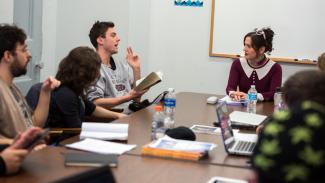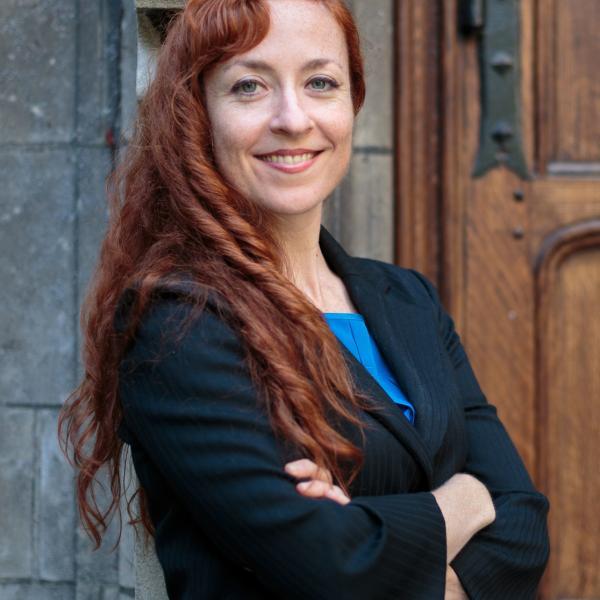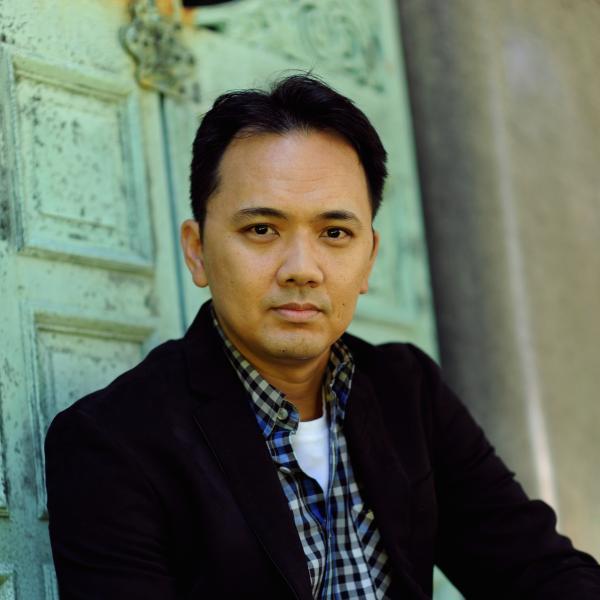
Making its home south of Midway Plaisance in Taft House, The Program in Creative Writing is an intersection of imagination and critical inquiry. Creative Writing offers an array of writing-workshop-based classes in a variety of genres, from fiction and poetry to creative nonfiction and translation. In addition, MAPH students focusing in creative writing have the unique opportunity to inform their creative projects with rigorous analytic research in a variety of subjects, such as Art History, Cinema and Media Studies, Comparative Literature, English Language and Literature, Gender and Sexuality, Philosophy, and Visual Arts.
Selected Faculty
Sample Courses
There are two open spots in every Creative Writing course with a grad section; MAPH students in the Creative Writing Specialization get priority in these courses, and require instructor permission to register for open slots. There is no prerequisite on any grad section and all MAPH students are exempt from prerequisites. You can find the numbers for grad sections on Class Search or CIM.
If the two grad spots are already taken there is still a chance that the instructor would be interested in adding additional graduate students. In that case, students should write to the instructor, ask to be added to the waitlist and once they get the OK, plan to enroll during add/drop.
Please visit the Creative Writing page for more details on classes and registration.
Beginning Fiction Workshop: The Engines of Narrative
(CRWR 30206/Section 2) Autumn 2024
This nuts-and-bolts of fiction writing class begins with the question: what drives a story? What are the different engines that a writer can use to craft momentum in a story, and how does one tune these engines for greatest effect? We will cover such engines as plot, conflict, suspense, narrative questions, worldbuilding, and narrative pacing through revelations about characters and their world. In addition to submitting two stories or excerpts for workshop (plus a revision of one), expect to read and discuss a selection of published work. (Augustus Rose)
Beginning Fiction Workshop: Somebody Somewhere
(CRWR 30206/Section 1) Autumn 2024
Character and setting are nearly inextricable forces in storytelling. In effective fiction, we often experience one through the other. We will explore this dynamic relationship and study how writers often put their characters at odds with their chosen setting to create and sustain tension in a story. We’ll also give attention to rendering our characters and settings with specificity—learning how to create the sense of “somebody somewhere” instead of “anybody anywhere.” Our reading list will focus on short fiction. Students will write many exercises at the beginning of the quarter and fully realize one complete story to submit for workshop discussion by the end. (Ryan Van Meter)
Technical Seminar In Fiction: Beginnings (CRWR 40226) Autumn 2024
This technical seminar will investigate the purposes and possibilities of beginnings in fiction. Students will read opening lines, paragraphs, pages, and occasionally chapters, from Aimee Bender, Miranda July, Dorthe Nors, Kobe Abe, and others, asking: what work do these beginnings do—and why, to what end? Of course, this means we will also read the stories that follow, to analyze these introductions in the framework of their narratives. How do openings guide—or mislead—the reader? How should they balance introduction and momentum? How do they orient us, not only to character, setting, and conflict, but also to elements like tone and sensibility, to a story’s own sense of itself? What archetypes or common “moves” can we identify and use? What are the implications and meanings of beginnings—of starting in a particular place and way, when a story might very well start in any number of places? And how do such authorial decisions ripple through the story? Students will be responsible for reading responses, short craft analyses, vigorous class participation, and several creative exercises putting what they learn into practice. (Ben Hoffman)
Beginning Poetry Workshop: Boundaries of Poem and Prose
(CRWR 30306/Section 1) Autumn 2024
This workshop-centered course introduces writers to foundational concepts and tools in the craft of poetry, including form, diction, voice, line, and meter. In particular, we will explore the boundaries of "poetic language" and utterance through bordered genres like prose poem, concrete/visual poem, sound poetry, and lyric essay, including work by poets visiting the UChicago campus. Regular assignments include both prompts and imitations in poetry writing, and will culminate in a final portfolio developed in working consultation with the instructor. (Garin Cycholl)
A more comprehensive list of courses and descriptions is available at the Creative Writing course page.
Creative Writing Specialization
The Creative Writing Specialization allows students to structure their coursework and thesis around Creative Writing within MAPH. Students who complete the following requirements will receive a Creative Writing transcript notation:
- MAPH Core course (Foundations of Interpretive Theory).
- One Creative Writing course in the student's chosen genre in Fall Quarter.
- Creative Writing Thesis/Major Projects workshop in Winter Quarter.
- Three academic courses relevant to the student’s proposed thesis area.
- Two elective courses to be taken in any area of student interest.
- Creative Writing thesis
Please direct any questions you may have about specializing in Creative Writing to maph-support@uchicago.edu.
Two-Year Language Option for Creative Writing
MAPH's Two-Year Language Option is a great way for students to pursue advanced work in literary translation in their second year. Some possibilities might include advanced workshops on literary translation in various genres, upper-level undergraduate seminars and graduate courses in non-Anglophone literatures across a range of geographical regions and historical periods, and courses on translation theory.
Lawrence Grauman Jr. Fellowship Fund
The Grauman Fellowship, made possible by a generous legacy gift from Lawrence Grauman Jr. (AM '63), supports MAPH students studying English and/or Creative Writing, with a strong preference whenever possible for students who focus their studies on nonfiction writing or literary journalism.
MAPH applicants who plan to work on creative nonfiction or literary journalism can indicate an interest in the Grauman Fellowship on their application.
Recent Creative Writing Thesis Projects
“Brains, Bodies, and In-Betweens: A Guidebook for Swamptown and Necropolitics in Horror Depictions of the Fragmented Self”
Claire Moacdieh, MAPH ‘25
Advisor: Valer Popa
“Writing Through Heartbreak and Reconciliation”
Autumn Davis, MAPH ‘25
Advisor: Nicholas Twemlow
"Wonders of Unsung Black Life: A Poetic Interpretation on Living in Blackness"
Tia White, MAPH '21
Advisor: Margaret Ross
"Once and Future Gardens"
Sarah Hobin, MAPH '21
Advisor: Lina Ferreira Cabeza-Vanegas
"From the Well That Washes Itself: A Novel (Excerpt)"
Hajrije Kolimja, MAPH '20
Advisor: Rachel DeWoskin



